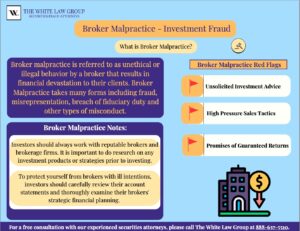Broker Misconduct and Broker Fraud – What’s the Difference?
Broker misconduct refers to unethical or improper behavior by a stockbroker or financial advisor while handling a client’s investment accounts. While not all instances of misconduct are necessarily fraudulent, misconduct can encompass a wide range of actions that harm investors or violate industry regulations.
If you have suffered losses due to wrongdoing by your broker or financial advisor you may need to hire an experienced broker fraud lawyer, like the attorneys at The White Law Group.
The White Law Group – National Broker Fraud Lawyers
If you’ve experienced losses in your investments as a result of broker negligence or broker misconduct, the broker fraud lawyers at The White Law Group may offer assistance. Our two-attorney securities law firm has handled more than 700 FINRA arbitration claims since 2010.
The Financial Industry Regulatory Authority (FINRA), which serves as the primary regulator of the securities industry, operates the largest dispute resolution platform for securities-related disputes. In fact, almost all conflicts involving investors, brokerage firms, and individual brokers are handled through FINRA Dispute Resolution. This is primarily because the majority of brokerage firms include mandatory arbitration clauses in their account agreements, requiring investors to address their disputes through FINRA.
If you’re seeking to recover damages resulting from the actions of an unscrupulous or negligent broker, The White Law Group’s broker fraud lawyers can initiate an arbitration claim or request mediation through FINRA. It’s important to note that you generally have six years from the alleged act to file your claim, although there may be exceptions to this rule.
Broker misconduct may include any of the following:
Unauthorized Trading: Making trades in a client’s account without their consent or approval.
Churning: Excessively trading securities in a client’s account to generate commissions for the broker without regard for the client’s investment goals.
Misrepresentation: Providing false or misleading information about an investment to entice a client to buy or sell.
Failure to Supervise: Firms and brokers have a duty to supervise their employees and ensure compliance with industry rules and regulations. Failure to do so can constitute misconduct.
Broker Negligence: Failing to exercise reasonable care and diligence in managing a client’s investments.
Breach of Fiduciary Duty: Brokers are held to a fiduciary standard, which means they must act in the best interests of their clients. A breach of this duty can be considered misconduct.
High-Pressure Sales Tactics: Using aggressive or coercive tactics to persuade clients to make investments that may not be suitable for their financial situation or goals.
Selling Away: Engaging in private securities transactions (selling away) without the proper disclosure and approval from the brokerage firm.
Excessive Fees: Charging clients excessively high fees or commissions that are not in line with industry standards.
Unsuitable Recommendations: Recommending investments that are not suitable for a client’s risk tolerance, financial situation, or investment objectives.
Insider Trading: Trading securities based on non-public, material information, which is illegal.
Forgery: Signing documents or authorizations on behalf of a client without their knowledge or consent.
 While some instances of broker misconduct may involve fraudulent activities, not all misconduct rises to the level of fraud. Broker Fraud typically involves intentional deception or misrepresentation for the purpose of financial gain. However, misconduct can still result in significant financial harm to investors and can lead to disciplinary actions by regulatory authorities such as FINRA (Financial Industry Regulatory Authority). If you have suffered losses due to broker misconduct, you may need the services of an experienced broker fraud lawyer.
While some instances of broker misconduct may involve fraudulent activities, not all misconduct rises to the level of fraud. Broker Fraud typically involves intentional deception or misrepresentation for the purpose of financial gain. However, misconduct can still result in significant financial harm to investors and can lead to disciplinary actions by regulatory authorities such as FINRA (Financial Industry Regulatory Authority). If you have suffered losses due to broker misconduct, you may need the services of an experienced broker fraud lawyer.
How do I Know if I’m a Victim of Broker Misconduct or Broker Fraud?
Detecting whether you’ve been a victim of broker fraud or broker misconduct can be challenging, as some forms of misconduct may not be immediately apparent. However, there are several signs and red flags to watch for that may indicate you’ve been a victim of broker wrongdoing:
Unexplained Losses: Sudden, significant losses in your investment portfolio that cannot be attributed to market fluctuations or economic conditions may raise suspicions of misconduct.
Unauthorized Transactions: If you notice trades or transactions in your account that you did not authorize or were not aware of, this could indicate unauthorized trading, a form of broker misconduct.
Excessive Trading (Churning): Frequent and excessive trading in your account, driven by the broker’s desire to generate more commissions, is a form of misconduct known as churning.
Unsuitable Recommendations: If your broker recommended investments that are clearly unsuitable for your risk tolerance, financial goals, or investment horizon, this may be a sign of wrongdoing.
Lack of Transparency: If your broker fails to provide you with clear and complete information about your investments, fees, risks, or performance, this may indicate a lack of transparency and broker misconduct.
Failure to Follow Instructions: If your broker consistently disregards your instructions or preferences regarding your investments, this could be a sign of wrongdoing.
Conflicts of Interest: Be wary of situations where your broker has undisclosed conflicts of interest, such as recommending products or services from which they stand to gain personally.
False Statements or Misrepresentations: If your broker provided false or misleading information about an investment to entice you to buy or sell, this may constitute fraud.
Neglecting Your Risk Tolerance: If your broker consistently recommends high-risk investments, despite your stated preference for low-risk options, this could be misconduct.
Missing Documentation: If you do not receive proper documentation of your investment transactions or account statements, this may indicate a lack of transparency or potential broker misconduct.
Lack of Communication: If your broker fails to communicate with you regularly or respond to your inquiries and concerns, this could be a sign of wrongdoing.
Inconsistent Investment Strategy: If your broker frequently changes your investment strategy without clear justification or communication, this may be a red flag.
What about Broker Negligence?
Broker negligence comes into play when a broker fails to exercise the appropriate level of care, diligence, and competence when handling a client’s investments or providing financial advice. It involves a breach of the duty of care that brokers owe to their clients. Broker negligence can take various forms.
Brokers have a duty to understand their client’s financial situation, investment objectives, risk tolerance, and other factors. Negligence can occur when a broker fails to gather and consider this essential information when making investment recommendations. For example, suggesting high-risk investments to a risk-averse client would be considered negligent.
Brokers are expected to conduct thorough research and due diligence on investment products they recommend. Negligence can occur if a broker fails to adequately research an investment or provide accurate information to the client. Once investments are made, brokers have an ongoing duty to monitor and manage those investments. Negligence may arise if a broker fails to provide proper oversight or neglects to adjust the investment strategy as needed.
Brokers must disclose any conflicts of interest that may affect their ability to provide impartial advice. Negligence can occur if a broker fails to disclose such conflicts, potentially leading to biased recommendations.
Broker negligence may also occur if a broker fails to keep the client informed about their investments or changes in the market that may affect their portfolio. If a client provides specific instructions or restrictions on their investments, a broker has a duty to follow those instructions. Negligence can occur if the broker disregards or fails to adhere to the client’s directives.
When broker negligence leads to financial losses or harm to a client, the client may have legal recourse to seek compensation. Consulting with a broker fraud lawyer can be essential for clients seeking help for broker negligence.
If you Suspect Broker Fraud or Broker Misconduct
If you suspect broker fraud or broker misconduct, take the following steps:
-Carefully examine your account statements to check for unauthorized transactions or discrepancies.
-Keep records of all communication with your broker, including emails, account statements, and notes from phone calls or meetings.
-Consult with a broker fraud lawyer: Consider seeking legal advice from a securities attorney who specializes in broker misconduct cases, such as those at The White Law Group. They can help you assess your situation and guide you through the necessary steps.
If you believe you’ve been a victim of broker misconduct, you can file a complaint with regulatory bodies like FINRA (Financial Industry Regulatory Authority).
FINRA Rules Protecting Investors from Broker Misconduct
FINRA has established a set of rules and regulations to address broker misconduct they include procedures for investigations and sanctions when violations occur. Here are some of the key FINRA rules related to broker misconduct and the potential sanctions:
FINRA Rule 2010 – Standards of Commercial Honor and Principles of Trade:
FINRA rule 2010 requires members and associated persons to observe high standards of commercial honor and just and equitable principles of trade. Sanctions for violations can include fines, suspension, or expulsion from FINRA membership.
FINRA Rule 4111 – Restricted Firm Obligations:
FINRA Rule 4111 requires brokerage firm members with a history of broker misconduct to put aside reserve funds to pay for future and unpaid investor claims. The rule requires member firms identified as “Restricted Firms” to deposit cash or qualified securities in a segregated, restricted account, adhere to specified conditions or restrictions, or comply with a combination of such obligations.
FINRA Rule 311 – Supervision Rule:
- FINRA Rule 3110 requires brokerage firms to diligently supervise the activities of their representatives to ensure compliance with FINRA and SEC rules and regulations, as well as federal and state laws.
When FINRA identifies broker misconduct and broker fraud through investigations, it has the authority to impose a range of sanctions depending on the severity of the violation. Sanctions can include fines, suspension, expulsion from FINRA membership, cease and desist orders, and restitution to affected customers. In certain cases of particularly egregious misconduct or repeated violations, criminal or civil actions may be pursued by regulatory authorities or law enforcement agencies.
FINRA Arbitration to Recover Losses
The broker fraud lawyers at The White Law Group can help you file a FINRA arbitration claim to recover losses from broker misconduct and/or broker fraud. If your brokerage firm failed to supervise your broker or financial advisor, they may be liable for your losses. Our firm will begin by assessing the case’s viability, offering guidance on legal options, and helping you file arbitration claims correctly and on time.
We will build strong cases by gathering evidence, identifying witnesses, and preparing compelling legal arguments. During arbitration proceedings, we serve as advocates, presenting the case, cross-examining witnesses, and safeguarding your rights. If negotiations are possible, we may engage in settlement discussions to secure fair compensation without a full hearing.
The White Law Group is a national securities fraud, securities arbitration, and investor protection law firm with offices in Chicago, Illinois and Seattle, Washington. We represent investors in all 50 states in claims against their brokerage firms. Our broker fraud lawyers have recovered millions of dollars from many brokerage firms in the past.
If you are concerned about your investments, please call the broker fraud lawyers at The White Law Group at 888-637-5510 for a free consultation.
For more information on The White Law Group, and its representation of investors, please visit WhiteSecuritiesLaw.com.


